Deleted, but not forgotten … a critical US climate map is reinstated
BB28 – The Future Risk Index by FEMA (reinstated by The Guardian)
In 2021, FEMA released a tool that allowed Americans to assess their country’s future risk of extreme weather events. Then, under the Trump administration, it quietly disappeared.
Fast forward to March 2025, and The Guardian resurrected the risk map, drawing data from across federal agencies. The result? A rare but urgent glimpse into a climate future some would prefer to keep hidden.
The tool is simple. Enter your area, and the map reveals its projected exposure to floods, fires, heatwaves, droughts and hurricanes based on historical data, as well as future predictions. It reframes climate change as not just a global crisis, but a local one. It zooms into your backyard, tracing how climate hazards impact communities, neighbourhoods, and lives. For local governments, insurers, utilities, and citizens, this kind of data is vital to help plan, prepare, and adapt.
This makes its earlier deletion all the more troubling. Why was a tool built to help the most vulnerable communities erased? Suppressing critical climate insights raises urgent questions about transparency, accountability, and the politics of information.
By bringing the map back, The Guardian returns a lost tool to the public, and reminds us that climate data is power. When it’s suppressed, we all lose. Erasing the map doesn’t erase the risk, it just leaves people underprepared and unarmed against disasters they were never warned about.
The revival of this project reframes climate awareness as an act of public memory, like digging up a buried time capsule and finding it still ticking like the bomb it surely is.
Workshops: UX and data visualisation
We’re running a series of online and in-person workshops from our studio at Makerversity in Somerset House, London. They’re ideal for people working with data who are seeking guidance on how to effectively engage their audience. No prior design expertise is required.
Online talk: How data and design can transform philanthropic decision-making
Philanthropy runs on bold ambition — but turning ambition into impact requires the right data, evidence, narrative, and collaboration to drive real-world outcomes. Join us for a timely online talk from Simon Worthington (Founder of data and technology consultancy Register Dynamics) and Marco Bernardi (Head of Design at Applied Works) — both working at the intersection of data infrastructure and design. They'll explore how funders, grantees, and data practitioners can build the conditions for better decision-making.
This newsletter is brought to you by award-winning design studio Applied Works. Want to submit something to Rows & Columns? Share it with us here




